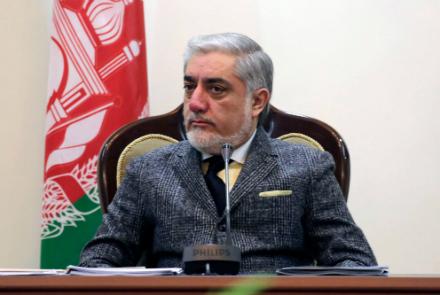The Chief Executive Abdullah Abdullah’s office says the authority believes that the issuance of the electronic national identity cards, e-NIC, is an important national issue and that it requires further discussion and attention.
Abdullah’s office said in a statement that “a national consensus is required in this respect”.
“To achieve a national consensus and prevent further rift, the Chief Executive Office had called for delay in the roll out of the electronic national identity cards,” the statement said.
The Chief Executive of Afghan government will talk on the issue with President Ashraf Ghani on Saturday, the statement added.
The statement says the issuance of electronic national identity cards must be discussed in government level and should be solved.
This comes after sources said on Thursday that President Ashraf Ghani, First Lady Rula Ghani and Second Vice President Mohammad Sarwar Danish were among the first applicants whose names were entered into the database of the electronic national identity cards.
It is expected that the names of other senior officials and members of the cabinet and politicians will be included into the database on Friday, the sources said.
The source added that within three days, the applicants whose names have been entered into the database will receive their electronic identity cards.
Nationality and 14 ethnicities have been included in the e-NIC, the source said.
The presidential palace has not yet commented on this new development.
Brief journey of e-NIC
The multi-million-dollar e-NIC plan ahead of elections in Afghanistan has stirred heated debate, ethnic animosity and political controversy as the country tries to tackle issues on the security and economic fronts. Afghan political leadership and parliament members never had a united stance on the e-NIC rollout.
On January 2, the office of Chief Executive Abdullah Abdullah (CEO) asked parliament members to finalize Ghani’s legislative decree on the electronic national identity cards (e-NIC).
A Divided parliament
Back in November 2017, Afghanistan’s Senate approved a legislative decree issued by Ghani stating the new electronic identity cards will note religion and ethnicity information of each person.
However, the Lower House of Parliament initially voted against the decree, but later a joint commission from the House of Representatives and Senate was established to debate the issue.
On December 18, a joint commission of Afghanistan’s national assembly approved Ghani’s decree on the inclusion of nationality and ethnicity in the new electronic identity cards.
The controversy over the inclusion of information on nationality and ethnicity has been delaying the much-awaited process for several years.
Following that, the Senate's defense committee and members of the joint commission called on the e-NIC department to swiftly start the roll out process to the people of Afghanistan.
In October, officials from the Population Registration Office and electronic National Identity Cards announced that the new e-NIC will contain nationality and ethnicity information and that they will start the roll out process soon.
This comes after members of the Wolesi Jirga (the Lower House of Parliament) had rejected Ghani’s legislative decree to amend the population registration law that said the nationality and ethnicity information should be included in e-NIC.
In December, over 50 members of parliament signed a petition against the decision taken to include nationality and ethnicity in the new electronic National Identity Cards (e-NIC).
The MPs said the inclusion of such information was not necessary and urged government to review the decision.
Following the establishment of the National Unity Government (NUG), Ghani approved the law of population registration in which the inclusion of nationality and ethnicity information was not included.
Major breakthrough
The breakthrough comes at a time that Afghan people have always said the electronic National Identity Cards should be rolled-out without considering any political perspectives from being factored in, nor should there be any political interference.
Afghan political elites and members of the public and observers say that e-NIC would have significant implications on ensuring the credibility of future elections in Afghanistan.


